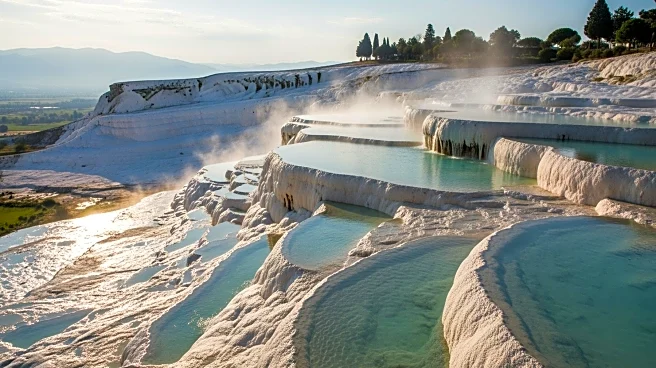What's Happening?
Pamukkale, located in southwestern Turkey, is renowned for its stunning white travertine terraces and thermal pools. These natural formations have been a tourist attraction for centuries, drawing visitors
from around the world to experience the unique landscape and therapeutic waters. The site, part of a UNESCO World Heritage area, includes the ancient city of Hierapolis. Despite its popularity, recent changes have restricted access to many of the pools, leading to some dissatisfaction among tourists. The site management has redirected water and closed off certain areas to prevent degradation, which has altered the experience for visitors. Nonetheless, Pamukkale remains a significant draw due to its historical and geological significance.
Why It's Important?
Pamukkale's status as a UNESCO World Heritage site underscores its global cultural and historical importance. The restrictions imposed to preserve the site highlight the challenges of balancing tourism with conservation. This situation reflects broader issues faced by heritage sites worldwide, where the need to protect natural and historical assets must be weighed against economic benefits from tourism. The changes at Pamukkale may influence how other sites manage visitor access and conservation efforts. Additionally, the site's appeal continues to contribute to Turkey's tourism industry, providing economic benefits to local communities despite the limitations.
What's Next?
The ongoing management of Pamukkale will likely involve further measures to balance conservation with visitor experience. Authorities may explore additional ways to enhance the site's accessibility while ensuring its preservation. This could include developing alternative attractions in the surrounding area to distribute tourist traffic more evenly. The local tourism industry may also adapt by promoting nearby geothermal attractions, such as the town of Karahayit, to offer visitors a broader experience. Continued monitoring and adjustments will be necessary to maintain Pamukkale's status as a premier destination while safeguarding its unique features.
Beyond the Headlines
Pamukkale's transformation from a freely accessible site to a regulated tourist attraction raises questions about the impact of tourism on natural wonders. The site's history as a 'gateway to Hell' and its ancient significance add layers to its modern appeal. The changes reflect a shift in how cultural heritage is valued and protected, emphasizing sustainability over immediate economic gain. This approach may serve as a model for other sites facing similar pressures, highlighting the importance of long-term preservation strategies in the face of growing global tourism.











